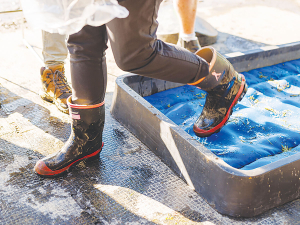State of the Dairy Nation 2024/25: DairyNZ Highlights Record Milk Production and Export Growth
DairyNZ's chief executive Campbell Parker says the 2024/25 dairy season reinforces the importance of the dairy sector to New Zealand.
 Good biosecurity practices also help to manage endemic diseases like Bovine viral diarrhoea (BVD) and Johne’s disease.
Good biosecurity practices also help to manage endemic diseases like Bovine viral diarrhoea (BVD) and Johne’s disease.
OPINION: When it comes to biosecurity, we often hear about the end of a response, but it’s the beginning that helps determine our success.
August is Biosecurity Awareness Month and a timely reminder that we need to stay vigilant to help protect our valuable dairy sector.
In June, it was reported that New Zealand could be provincially declared free of Mycoplasma bovis (M. bovis) as early as October 2025; A huge milestone and one we should be proud of.
It’s a milestone that could only be achieved through the tough decisions made along the way.
We want to take the experiences and lessons we had through the M. bovis response to prepare for future disease outbreaks.
We recently signed a new operational agreement on Foot and Mouth Disease (FMD) with the Government and sector partners which sets out how the costs of FMD readiness and response activities will be shared.
It also creates legally binding participation of industry in decision-making, ensuring that farmers’ interests, knowledge, and input is heard.
It is a real partnership, not only between the sector and Government but also within sector partners.
As part of the agreement, dairy, beef, sheep, pork, and deer farmers are represented, as well as dairy and meat processors. Each has a strong voice at the negotiation table.
As the inaugural chair of the Foot and Mouth Disease Council it’s something that I’m personally proud to have achieved. And I want to keep that momentum going.
We are reviewing our FMD operational plans and looking at the role the sector plays during a response.
We want to boost our workforce capability and capacity, so we have the right people with the right knowledge in place if we had another serious disease outbreak.
We are also focusing on refining the compensation system. We need a pragmatic and fair system that will provide farmers with the support they need. That includes timely, fair, and consistent compensation that allows farmers to get back to business as fast as possible.
Good biosecurity practices not only provide a degree of protection against potential exotic disease outbreaks, but they can also help to manage endemic diseases like Bovine viral diarrhoea (BVD) and Johne’s disease.
It can be as simple as:
Biosecurity is not just about emergencies, it's about a consistent and integrated approach to risk reduction, readiness, response, and recovery.
Getting the planning right isn't just important, it's everything.
Campbell Parker is DairyNZ chief executive.
Budou are being picked now in Bridge Pā, the most intense and exciting time of the year for the Greencollar team – and the harvest of the finest eating grapes is weeks earlier than expected.
The Real Estate Institute of New Zealand (REINZ) has released its latest rural property report, providing a detailed view of New Zealand’s rural real estate market for the 12 months ending December 2025.
Rural retailer Farmlands has released it's latest round of half-year results, labeling it as evidence that its five-year strategy is delivering on financial performance and better value for members.
OPINION: "We are back to where we were a year ago," according to a leading banking analyst in the UK, referring to US president Donald Trump's latest imposition of a global 10% tariff on all exports into the US.
DairyNZ says the Government’s proposed Resource Management Act reform needs further work to ensure it delivers on its intent.
Overseas Trade Minister Todd McClay says he's working constructively with the Labour Party in the hope they will endorse the free trade agreement (FTA) with India when the agreement comes before Parliament for ratification.